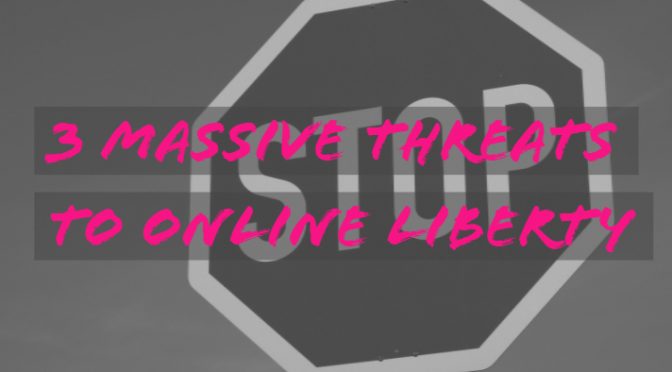For British users at least, the Internet as we know it is about to change fundamentally. This development isn’t sudden: I’ve tracked the rising censorship regime for 10 years, from its early days as a voluntary pilot project called BBFC Online. But to most people, used to having access to most online content, the changes due to begin later this year will be seismic.
This shift represents a significant power-grab by elements of the British state that have resented their loss of power as the Internet has come to supplant TV, radio and newspapers. In particular, this refers to the media regulator Ofcom, which has amassed huge power to censor TV and radio, and has seen itself diminished by the rising power of the digital network. The rise in censorship is, in part, due to Ofcom (and its government supporters) trying to rebuild its old powers of control. But the coming changes go far further than that.
Threat #1: The Digital Economy Act (2017) introduced an official online censor
This issue has been one of my primary focuses. As presented by the government, the DEA simply introduced steps to protect children from viewing pornography. But this misses the point. In fact, the DEA creates the role of online content “regulator” (i.e. censor), with the power to block websites that don’t comply to its rules. Initially, its rules relate to sexual content (not just porn), so can be presented as sex-related. But the rules can – and will – be changed easily. The key change is the appointment of the BBFC, under the aegis of Ofcom, as the country’s first official Internet censor.
Although the law was passed in 2017, it was due to go live in April 2018. This was delayed, most likely for technical reasons, and is now expected in late-2018. When it goes live, most sexually explicit content online will be blocked by ISPs. The only content to be allowed through will be hosted on the handful of sites that age-verify their users.
This significant change to British culture has largely been dismissed by news editors as “ah well, it’s just porn”. Likewise, campaigning organisations like the Open Rights Group have focused too narrowly on the threat to pornography rather than the far broader threat to free expression. Yet Ofcom and the government haven’t tried hard to disguise the fact that the regime will be extended beyond sexual content in future – porn is just the testing ground.
Threat #2: the drive towards “online safety”
This month, the government announced ominous plans to improve “online safety”, while exhibiting a shyness to explain what that actually means. This new law will take a couple of years to put into place: the likelihood being that this will be the second, far broader wave of censorship following the “porn block” test phase. As I describe in Porn Panic!, sections of the feminist movement in particular have been keen to describe speech as “online violence” to deliberately blur the line between expression and action. This law signals an extension of existing powers against hateful or merely offensive content.
Threat #3: laws against “sex-trafficking”
As everyone knows, sex-trafficking is one of the great threats of the 21st century. Except it isn’t. Fueled largely by anecdotes rather than solid data, the anti-prostitution and anti-immigration movements have united to create a scare-story that has gripped the media and political class. Upon the back of this myth rides a huge new industry – dubbed the Rescue Industry by researcher and author Laura Agustin.
The shortage of victims doesn’t stop the Rescue Industry – it simply raises its rhetoric to ever greater levels of hysteria to drown out sober commentators. And now, sex-trafficking is the excuse for America’s greatest ever attack on Internet freedom. The FOSTA act, signed recently into law by President Trump, criminalises online platforms for enabling sex trafficking. In practise, this means that not only escort listing services, but hookup and dating sites, and even Google, have been forced to censor their platforms. Craigslist closed its personals section in the UK as well as the US. Now, in a huge escalation of the porn panic, all sex might be sex trafficking, and so all online attempts to find sexual partners may criminalised.
In the short term, should this idea cross the Atlantic, this raises a threat to British escort listings sites like AdultWork and Viva Street (the latter is already likely to struggle to implement the age verification measures within the Digital Economy Act). This, despite the fact that prostitution is broadly legal in the UK, unlike in America. In the longer term, any site with user-submitted content, from social networks to forums, may face problems.
The principle that platforms are now responsible for the content they host will inevitably seep into UK culture. Combined with the blocking effects of the Digital Economy Act and the planned drive towards “online safety”, the direction of travel is obvious: only those sites – like Facebook – that can spend vast amounts of time and money policing their content can be confident they will survive.
